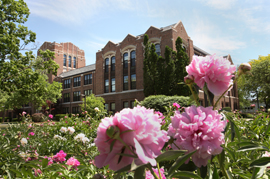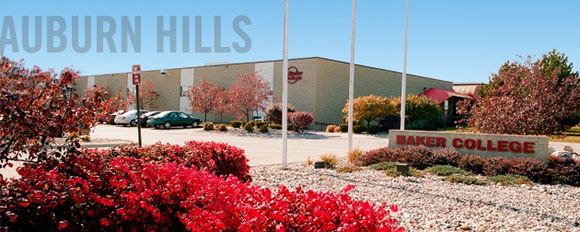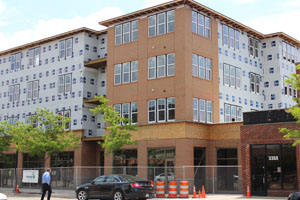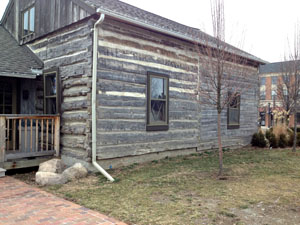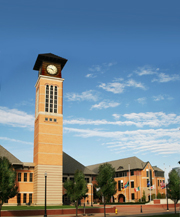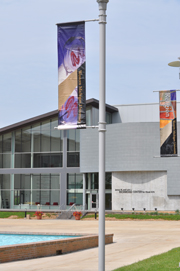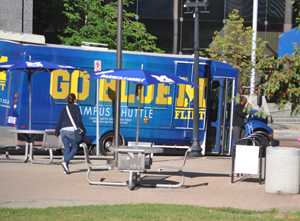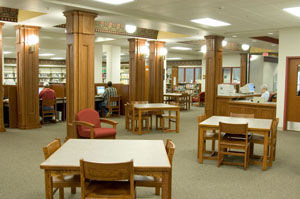
Members of the CMU Greek community join together several Sunday mornings each semester to clean up Mt. Pleasant’s streets.
By Kathleen Ling and Dr. George Ross
“Mt. Pleasant was destined to have a college,” John Cumming wrote in his book, “This Place Mount Pleasant,” published during the city’s centennial in 1989.
An interest in education started early in our history and has continued since — the city helping to support a university, and the university helping to shape a city. Central Michigan Normal School and Business Institute, now known as Central Michigan University, opened in 1892 with the collaboration of determined residents.
Today, much of the city’s active, community-oriented culture, stable economy, small business growth and real estate development are impacted by the needs of CMU students, faculty and staff.
Pedestrian-friendly
Using a car to cross campus or town is becoming a second thought as the city and university work together to create a bikable and walkable community with a thorough network of bicycle lanes and sidewalks.
In 2010, the city worked with Dan Burden, executive director of the Walkable and Livable Communities Institute, on a Campus Connection project.
Summer in Mt. Pleasant brings with it the Festival of Banners, a community-wide collaboration that decorates the streets of Mt. Pleasant.
The project was designed to improve city streets to better connect campus to downtown and other areas of the city.
Streetscape charm
We work together all year to keep those streets decorated and clean.
Each summer, Art Reach of Mid Michigan lines city streets with banners painted by community artists of all ages.
CMU faculty, staff and students have a definitive presence in this colorful, unique public exhibit.
During the Dickens’ Christmas Festival, CMU fraternities and sororities decorate their homes with lights seen by festival goers during hayrides through the streets.
Thanks to technology, the effort also is seen by thousands of “visitors” to university and city websites and social media.
Student/city partners
Collaboration between the city’s code enforcement team and Greek community at CMU has developed into “Greeks Clean the Streets.”

CMU were involved as volunteers and participants at the inaugural Freakin’ Freezing Challenge, a winter obstacle run established in 2013.
A few Sunday mornings each semester are spent removing trash along streets surrounding campus.
Going further, city-led events rarely take place without the help of CMU student volunteers, who assist with planning and execution of events such as the Freakin’ Freezing Challenge, a new winter obstacle run.
Students helping children
A spirit of care benefits even the youngest Mt. Pleasant residents.
In the Biobuds program, CMU graduate students visit elementary classrooms and share their passion for biology, engaging students in science at an early age.
Consider as well the CMU student teacher who worked with four mentally impaired students to create a solar system display.

A CMU student helps festival goers onto a hayride during Mt. Pleasant’s annual Dickens’ Christmas Festival.
The project grew to involve nearly 100 fifth-grade students producing a display now exhibited at the Mt. Pleasant Discovery Museum.
Jointly planning the future
As we move forward, the city and CMU are updating their master plans.
We’ve worked closely together and even hired the same transportation specialist to assure coordination.
This same collaboration has led to development of a town and gown group that meets monthly, with representatives from the city, CMU and area organizations.
The future is bright, and we look forward to moving into it together.
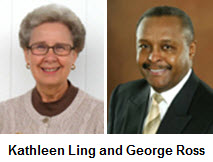
When you think of Mt. Pleasant, you think of CMU. When you think of Central Michigan University, you think of Mt. Pleasant.
That’s the way it should be.
Kathleen Ling is the Mayor of Mt. Pleasant and Dr. George Ross is the President of Central Michigan University. Ling was appointed mayor Mt. Pleasant by her fellow City Commissioners in January, 2013. Dr. Ross became the 14th president of Central Michigan University on March 1, 2010.


